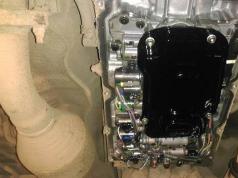Engine oil is an important component of any engine... Regardless of its design, this product is simply vital in it, as it performs two key functions, lubrication and cooling. It prevents excessive friction between metal parts and the formation of metal chips. As a result, the moving parts do not jam and work properly. Also, the lubricant is involved in cooling the pistons - with its help the heat generated during their movement is removed. But not all of them are monotonous, each of them is suitable only for a specific task, more precisely the engine and operating conditions, therefore, it matters which oil should be poured into - it will behave differently in different conditions.
The issue of choosing an oil is revealed in the video below, we recommend watching
To know exactly which oil is best used for a gasoline generator, you need to understand what it is. In its original form, it is raw oil... She has good lubricating properties and tough enough to hold onto lubricated parts. These properties were discovered at the end of the nineteenth century and patented in the United States. The first brand in the world was called “ Valvoline". But the product from ordinary oil, although it fulfills its function, is not pure enough for modern technology- Sulfur and wax create dirt and fumes, which negatively affects engine performance. Therefore, the alternative was synthetic oil applicable for a gas generator, which is extracted by distilling oil and disassembling it to the main components from which the base substance is made.
Various additives are added to it, thanks to which his performance characteristics .Another opinion on the choice of oil
Classification of oils
In total, several classifications have been created engine oils for . Each of them in one way or another characterizes the properties and distributes them into the appropriate groups. Among them, there are two main groups of classifications, this is API - in which substances are indicated by a set of performance properties and SAE - viscosity classification. Both of them characterize the engine oil for Gas engine.
API system designed in such a way that with its help, it was possible to select products corresponding to the service life and type specific engine... For oil on a gasoline engine, an S mark is assigned, the second letter characterizes the quality level. Thus, the lowest level is SG, which is suitable for older engines built before 1993. SH - for engines built in 1996, SJ - 2001, and SL - for more modern ones. In general, this classification contains substances with marks that start from the first letter of the English alphabet. The further this classification letter is from the beginning, the higher the quality of the oil. At the moment, the highest quality product is marked with the SN label.
Gasoline power plants, depending on the type of engine installed, require oil with certain properties and characteristics for operation. When choosing fuels and lubricants, first of all, pay attention to the manufacturer's recommendations. The technical documentation for each model says which oil needs to be filled in order to provide optimal conditions for engine operation. Also, the instructions indicate how much fuel and lubricants of each type and how often you need to change. For station owners who, for some reason, have to choose lubricants on your own, the general guidelines below will be helpful.
Oil type depending on engine type
Gasoline power plants can be equipped with two-stroke or four-stroke engines. Feature two-stroke motor is that its design does not provide for a separate crankcase into which oil must be poured. An engine of this type consumes a mixture of gasoline and oil that has been prepared in certain proportions. This type of generator requires an oil that will quickly and completely dissolve in gasoline. It should also completely burn out without leaving marks on the motor valves. Specially for two-stroke engines a series of T2 oils is produced.
But in this case, you need to be careful. This series of oils for two-stroke engines also includes the TC-W3 fuel and lubricants type. But they cannot be used in generator motors. This is a series of oils for engines of motor boats and jet skis that are in constant contact with water.
Gasoline power plants equipped with four-stroke engines have a wide range of engine oils. This somewhat complicates the choice of fuels and lubricants if the technical documentation for the generator is lost. Four-stroke engine oil is evaluated according to two main criteria:
- Viscosity (SAE);
- Operational properties (API).
Viscosity tells us the temperature of the air at which the use of this type of oil will be most effective and beneficial for the engine. Lubricants are available for winter and summer operation. By choosing the appropriate type of oil, you ensure the best lubrication of every part of the engine, which means that you extend its service life. Depending on the air temperature "overboard", it is necessary to use oil of the following viscosity grades:
- At temperatures from +4 ° C and above: 10W30, 10W40, 15W30, 15W40, 20W30, 20W40, SAE 30.
- At temperatures from -20 ° C to +4 ° C: 0W40, 0W50, 5W30, 5W40, 5W50, 10W30, 10W40.
Summer the best choice 10W30 oil can become, in the off-season it is better to give preference to samples 0W40, 0W50 (but preferably those that are labeled according to API SJ or SL). This marking indicates that these fuels and lubricants belong to the category of high-tech, in terms of their properties and characteristics, they perfectly meet the requirements of gasoline four-stroke engines.
The generator will work for a long time and flawlessly if you adhere to the following simple rules during its operation:
- Maintain the "running-in" mode of the new motor. This is usually the first 20 hours of operation. After that, it is advisable to change the oil.
- Observe the manufacturer's recommended service intervals. Change after 50-100 operating hours, depending on the type of oil used (mineral or synthetic).
- Before draining the old oil and filling in new oil, it is advisable to warm up the generator motor and carry out this procedure at its operating temperature.
- Before starting the engine, check the oil level with a special probe... If necessary, top up to the minimum value.
- Immediately after starting the generator, let it run for a couple of minutes. Idling, and only after warming up the motor, connect the load.
- If the unit is to be operated continuously for several hours, check the oil level periodically.
- Regardless of whether you start the station or not, the oil must be changed in autumn and spring (according to the operating season).
- Remember that gasoline generator cannot work continuously, it needs to be switched off periodically to cool the engine.
And most importantly, you should not save on the quality of fuels and lubricants and the frequency of oil changes. Depending on what kind of oil you pour into the crankcase, the generator will work reliably and for a long time, or it can constantly break down and "be capricious". It is important not only to change the oil on time, but also to fill it in accordance with the operating season. One of the most common reasons a generator can fail is a lack of lubrication in its engine crankcase.
To do right choice and for sure to decide which oil is best suited for the engine of your generator, contact our consultants for help. Using the form feedback ask your question, and in the very near future you will be provided with a qualified recommendation.
Oil is one of the most important components of any engine, without exception.
The most popular questions asked by generator owners are related to the choice of generator oil. For example: "What kind of oil to fill in the gas generator?", "How often to change the oil in the generator?" , "What kind of oil to fill in the gasoline generator engine?". You can get an answer to all these questions by reading this article.
The choice of oil for the generator should be approached with all seriousness, since the wrong choice often leads to malfunctions of the generatorless generator and to rapid engine wear.
Oil types
To begin with, it is worth figuring out what types of oil exist.
To work properly, two types of oil are used: engine oil and grease (which is for lubrication).
Engine oil is necessary for work between rotating and rubbing parts of the engines, while grease is intended to maintain the operation of plain and rolling bearings.
Oil grade
The product you choose plays an important role. It is worth paying due attention to the oil manufacturer, in the event that you prefer a high-quality product, and not a fake, then you need to choose an oil from a well-known manufacturer. Most famous brands such as: Honda, Esso, Oregon, Craftmsman, GT OIL, Briggs & Stratton and many more.
If you give your preference to one manufacturer, then you should adhere to it throughout the entire time, you should not change the brand too often.
It is advisable to make a purchase exclusively in large specialized stores with a decent reputation.
What if you still used a low-quality product?
Flush the engine system and refill with good quality oil.
Remember! The key to stable and long-term operation of your generator is quality oil.
Classification (marking) of oils
API- the system is designed so that thanks to it you have the opportunity to select the products corresponding to the required type of engine and service life.
S mark(first letter) - intended for oil for a gasoline engine.
The second letter characterizes the quality level (the further the letter is from the beginning of the alphabet, the higher the quality of the oil).
Today, the highest quality oil is considered to be marked with the SN mark.
It is advisable to use engine oils that meet API class SL, which are marked on the packaging.
SAE mark indicates the viscosity and fluidity of the oil.
The following SAE groups can be distinguished:
- winter(0W, 5W, 10W, 15W, 20W, and 25W), where the figure is at what temperature the oil can be used, naturally with a minus sign.
- summer(20W, 30W, 40W and 50W), this oil can be applied at temperatures above zero degrees.
- marking of universal oil- 5W-30, 5W-40, 10W-50 for operation at any temperature.
It is also important that for each engine, individually, depending on the manufacturer, power, etc. - all the oil cannot come up at once. Therefore, the temperature table (indicated below) of a specific product can help you in choosing.
For gas generators use high quality oils for 4-stroke engines, meeting the requirements of car manufacturers for service class not lower than SG.
Oil viscosity
As practice shows, it is not worth pouring synthetics. It is most likely to use semi-synthetics, which have the properties of synthetic and mineral oils.
So, the answer to the question …… ..
"How often do you change the oil in the generator?"
For each manufacturer, the question of changing the oil is individual. It is recommended to drain the break-in oil, and this must necessarily happen after 30-50 hours or 6 months. This should be done even if they write that it is not necessary to do this.
Remember!
Changing the oil in the gas generator is far from all the procedures for maintenance Your gas generator.
Depending on the operating time, it is necessary to carry out
timely procedures TO-0, TO-1, TO-2, TO-3, TO-4.
Works that includes MOT:
1. Oil change
2. Cleaning or replacing filters: fuel, oil and air.
3. Cleaning the fuel cock.
4. Cleaning and tuning the carburetor.
5. Adjustment of valves.
6. Replacing or cleaning the spark plug
7. Battery check, also check charger Battery
9. Diagnostics of all units of the generating set for extraneous noise.
10.Checking the protection system low level oils
11.Frequency and voltage setting.
12.Cleaning the fuel tank.
13.Checking and replacing the fuel hose,
14.Ignition diagnosis and adjustment
15.Checking the piston group
16.External cleaning from dirt
A simple oil change does not give any guarantee that your gas generator will continue to operate smoothly.
If the list is not met routine maintenance the generator can:
1) stop getting started
2.Light up
3.Clock
4. Burn off the load.
Do you need a 100% quality oil change or do you need maintenance?
Our experienced specialists will be able to quickly and efficiently, with the help of special equipment and tools, carry out any maintenance at affordable prices. Call by phones: 063 202-90-70 or 097 023-42-42.
There are a huge number of lubricant manufacturers on the market different types and the question arises what kind of oil to pour into the gas generator. It depends to a large extent on the environment in which the unit is operating and on what budget you are counting on.
Synthetics, semi-synthetics or mineral
We will not go into the process of making oils, I want to say only one thing: in terms of quality, synthetics are the best among all oils in terms of stability and their properties, they go a little worse semi-synthetic oil and in the niche itself stand mineral oils... In principle, any of them can be poured into the motor of a gasoline generator, everything depends on the amount that you are willing to spend. Synthetic is the most expensive of oils, semi-synthetics will be a little cheaper and the most budgetary is mineral water.
How to choose oil viscosity
The viscosity of gasoline generator oils depends on the temperature at which you will use the generator. If it's a street and it's summer or warm room then it will be enough 5W40 or 10W40- it is thicker. If the use of the gas generator will take place in an unheated room or outdoors at temperatures below 5 degrees, fill 5W30 or 10W30 it is thinner.
Advertising, marketing ploy
Salespeople have long come up with many stories about the need for a special oil for gas generators. I have heard stories more than once that a machine tool will not work, there is water cooling, and air cooling in gasoline generators, etc. This is all nonsense, the boiling point of oils starts from 300 degrees and more than one generator does not work at such temperatures. You can safely pour good car oils.
There are several classifications of engine oils:
Classification of oils by the aggregate of API performance properties;
SAE viscosity classification of oils.
API classification of engine oils for gasoline engines
SL - suitable for all engines. SL oils are formulated to provide better high temperature properties and lower oil consumption.
API classification distinguishes between oils for gasoline and for diesel engines... The first corresponds to the letter S, for example SH, SJ or SL, while the second letter indicates a higher level. Thus, the SL class was introduced into practice, improving and partly replacing the SJ class of engine oils. API - American Petroleum Institute (API - American Petroleum Institute).
SAE Classification of Motor Oils for Gasoline Engines
SAE (Society of Automotive Engineers - American Association of Automotive Engineers) describes the properties of viscosity and fluidity - the ability to flow and simultaneously lubricate the surface of a metal. The SAE J300 standard classifies engine oils into six winter oils (OW, 5W, 10W, 15W, 20W, and 25W) and five summer oils (20, 30, 40 and 50). Double number means multigrade oil (5W-30, 5W-40, 10W-50, etc.).
The combination of the viscosity values of summer and winter grades of oil does not mean an arithmetic combination of viscosity properties. For example, 5W-30 oil is recommended for operation at temperatures the environment from -30 to +20 ° C. Together with that summer oil can operate at temperatures up to 30 ° C, but only at ambient temperatures above zero.
Every engine internal combustion for special equipment is distinguished by a unique combination of the degree of force, heat intensity, design features, materials used and other nuances.
For gas generators use high quality oils for 4-stroke engines that meet the requirements of car manufacturers for service class not lower than SG. It is highly desirable to use engine oils that meet API class SL and are labeled on the packaging. Motor SAE oil 10W30 is recommended as a universal - for work at any temperature. Using the above data to select the optimal oil viscosity in accordance with the temperature of the environment in which the generator is operated, you can select another type of oil.
Still an almost perfect condition normal work the gas generator is the use of SL class engine oils with SAE viscosity characteristics suitable for the ambient temperature in the place where the gas generator operates. Recommended oils of API class not lower than SJ.
At temperatures above 4 ° C - 10W30, 10W40, 15W30, 15W40, 20W30, 20W40, SAE 30.
At temperatures from -18 ° С to +4 ° С - SAE 0W40, 0W50, 5W30, 5W40, 5W50, 10W30, 10W40.
At temperatures above +4 ° C, multi-temperature oils (10W-30, etc.) are consumed to a greater extent and can cause early engine wear. When using these oils, check the level more often than usual. When using SAE30 at temperatures below +4 ° C, starting can be difficult and the use of this oil can lead to premature engine wear due to lack of lubrication.







